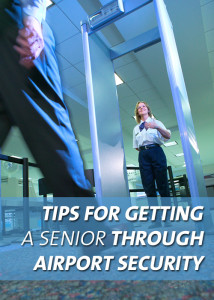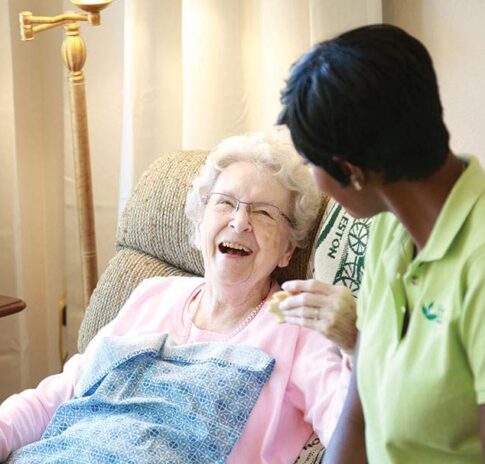Getting through airport security is without a doubt a hassle. There are the long lines that snake around the area as you inch forward with all your baggage. Then, when you finally get to the airport screeners, you have to take off your shoes, jewelry and coat, and remove your computer and liquids from your bag.
Extremely essential, but nonetheless, it can be exhausting!
In response to growing complaints, the Transportation Security Administration (TSA) has eased the rules for many seniors. Seniors over 75 no longer have to remove their shoes or outerwear. And if they trigger a metal detector, they will be allowed to pass through the detector a second time before being required to undergo a pat-down.

Here’s some additional tips from FirstLight Home Care to make the airport screening process as stress-free as possible for seniors:
- Wheelchairs. Because TSA has found some unauthorized items in wheelchairs and other mobility devices, TSA requires all people – whether they have a scooter, wheelchair, walker or cane – to be screened in some fashion. It’s best to call your departure and arrival airport in advance to verify their specific procedures. Can he/she walk or stand? What is their arm movement? All bags or satchels attached to mobility devices must be removed and placed on the X-ray belt for inspection.
- Hearing Aids or exterior cochlear implants do not need to be removed.
- Artificial Hips or Surgical Implants. It is best to advise security officers in advance of any implanted devices, because they will inevitably set off metal detectors. Security personnel may opt for alternative screening methods. Ideally, have your doctor provide a medical card explaining the location of the implanted
device. - Pacemakers. Seniors who have a pacemaker may or may not set off a metal detector. It is best to carry your device identification card. You can be asked to be cleared with a hand-held screening wand held away from a pacemaker. Prior to going through security, explain to security personnel that you have a pacemaker in order to have special arrangements made. The metal detector will not cause any damage to the pacemaker. If you have an implantable defibrillator, ask for a hand search, because the hand-held wand can cause a shock.
- Oxygen. Oxygen and other respiratory devices have to be screened prior to going through a security checkpoint. If the oxygen cannot be disconnected, tell the security officer who can arrange for an alternate inspection process.
- Medications. Pills and liquid medications should be clearly labeled, and if the quantity is greater than 3.4 ounces, it must be separated from other carry-on items and declared to a security officer as a medical necessity. If you have diabetes and are carrying vials, syringes, epipens or insulin pumps, you must also notify security personnel.
The TSA has a hotline to answer questions about the security process for passengers with
disabilities and medical issues called TSA Cares. The toll-free number is 1
(855) 787-2227. Be sure to call 72 hours before traveling so you have enough
time to make any changes before going through security.
